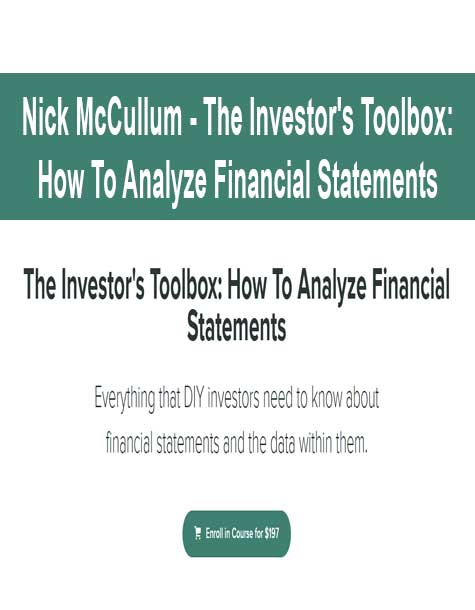Nick McCullum – The Investor’s Toolbox: How To Analyze Financial Statements
$197.00 Original price was: $197.00.$56.00Current price is: $56.00.
Proof of item:
One of the significant barriers that new investors face is financial statement analysis.
For those without formal accounting training, financial statements – called ‘the language of business’ – can be incredibly confusing…
…until now.
This course provides all the knowledge and training that individual, DIY investors need to know, including:
- Techniques for assessing profitability & growth
- Metrics that explain a firm’s financial strength
- A complete guide showing how to calculate relevant financial metrics
After completing this course, you should have an intermediate understanding of the accounting nuances necessary to succeed in the financial markets.
Course Curriculum
Course Information
StartCourse Format
Accounting Fundamentals
StartWhy is Accounting Knowledge Important?
StartThe Debit-Credit Accounting System
StartExamples of Journal Entries
StartHow To Find Financial Statements
Income Statement Analysis
StartThe Composition of the Income Statement: Revenue and Expenses
StartThe Three Types of ‘Profit’ and How To Analyze Them
StartDepreciation & Amortization
StartInterest, Income Tax, EBIT, and EBITDA
StartEarnings-Per-Share, Adjusted Earnings-Per-Share, & The Price-to-Earnings Ratio
Balance Sheet Analysis
StartThe Composition of the Balance Sheet
StartCurrent Assets, Current Liabilities, Working Capital, and the Current Ratio
StartAccounts Receivable and AR Aging
StartShareholders’ Equity, Book Value, and the Price-to-Book Ratio
StartFinancial Leverage: The Debt-to-Equity Ratio and Related Metrics
Cash Flow Statement Analysis
StartThe Composition of The Statement of Cash Flows
StartFree Cash Flow & Capital Expenditures
Multi-Financial-Statement Ratios & Metrics
StartDividend Payout Ratio
StartReturn on Assets, Return on Equity, and Return on Invested Capital
StartEstimating Total Returns
Conclusion & Congratulations
StartCongratulations!
StartShortcuts to Finding Financial Data
1 review for Nick McCullum – The Investor’s Toolbox: How To Analyze Financial Statements
| 5 star | 100 | 100% |
| 4 star | 0% | |
| 3 star | 0% | |
| 2 star | 0% | |
| 1 star | 0% |
Sorry, no reviews match your current selections
Q & A
Related products
Internet Marketing
Internet Marketing
Jeremy – Building Wealth Conference 2019 Full Video Recording
Internet Marketing
Internet Marketing
Nick Morton – Supplyant Consultancy Course – Foundation Level
Internet Marketing
Internet Marketing
Internet Marketing
Internet Marketing














Great deal Very fast shipping !!! | Nick McCullum – The Investor’s Toolbox: How To Analyze Financial Statements